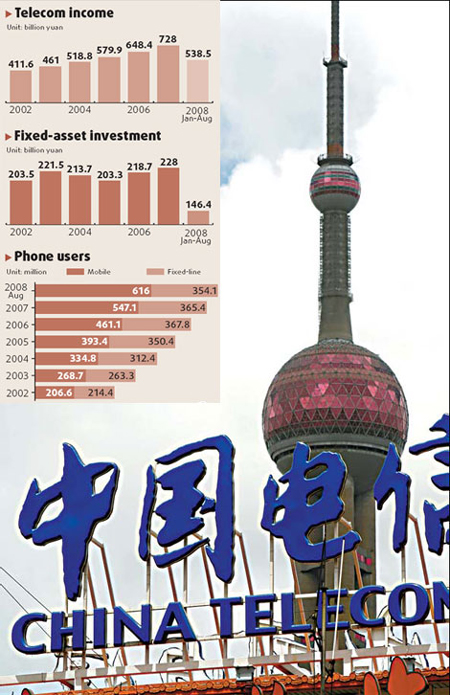
|
BIZCHINA> Center
 |
|
Related
Foreign operators ready to ride China's 3G wave
By Wang Xing (China Daily)
Updated: 2008-10-23 11:37 With the restructuring of China's telecom industry gearing up, foreign operators are pulling out all stops to seal local partnerships and position themselves for the 3G (third generation) era of the world's largest telecom market. "China's telecom restructuring gives us an opportunity to bring our mobile business to the country, as our domestic partners can get access to the wireless market after the restructuring," said Wang Chao, vice-president of Orange Business Service (OBS), a business service subsidiary under France Telecom. "After the restructuring, we hope to enter China's domestic service market by establishing strategic joint ventures with Chinese companies."
 Entering the Chinese market in 2001 by partnering with Chinese fixed-line operator China Netcom, OBS has established a significant presence in the country's telecom market. But the company's business has long been limited by regulatory restrictions and most of their customers in China were restricted to multinational companies. Wang said OBS plans to attract more domestic customers as the country's telecom restructuring completes. "We plan to boost our revenue from local customers to account for half of our total revenue in the next three years", he said, noting that the company will increase its employees in the country by 20 percent by the end of this year. Many foreign telecom operators have the same idea. Telefonica, Europe's second-largest phone company, announced last month it would pay as much as 1.1 billion euros to boost its stake in China Netcom, the country's fixed line carrier that will be merged with China Unicom, the country's second largest mobile phone carrier. South Korean telecom operator SK telecom, which held 6.61 percent of China Unicom's total equity before the telecom industry reorganization, also said it is seeking suitable opportunities to raise its stake in the company. "China's telecom restructuring creates a great opportunity for us," says Lily Zhang, China head of Pacnet, the Asia telecoms service provider formed by a merger of Asia Netcom and Pacific Internet earlier this year. "We plan to enter some of the local telecom services in the near future as we have already gained government licenses," added Zhang, whose company established a joint venture with Chinese Internet service provider Zhong Ren Telecom in July in order to expand its business in China. As if to reward these moves, the Chinese government announced on Sept 12 it would relax access to its telecom industry for foreign investors -by cutting minimum required investments by as much as 50 percent. Wang Yuquan, a senior consultant from research firm Frost & Sullivan China, said the government's deregulation may trigger a foreign investment boom in the Chinese telecom sector. "China has nearly completed its telecom restructuring and most of the Chinese telecom operators need huge investment to upgrade their existing networks after the restructuring," Wang said. China launched its long-awaited telecom restructuring in May, in which the country's current six telecom operators will be merged into three firms, offering both mobile and fixed line services. The Chinese government promised to issue 3G licenses after the restructuring, which was due by the end of the year. The proposed restructuring and 3G licensing are expected to create a huge thirst for capital among Chinese telecom operators who are actively expanding and upgrading their existing networks in order to gain a favorable position in the country's upcoming 3G environment. China Unicom, for example, announced in August it would invest 100 billion yuan from 2009 to 2010 in 3G-related networks and services. China Telecom also said it will invest 80 billion yuan to expand and upgrade its CDMA network. However, Wang Yuquan said that, although the government reduced the foreign investment cap by 50 percent, it does not mean that the country has loosened its control over its telecom industry. "Many foreign operators' moves to increase their stakes in Chinese operators are due to their desire to have controlling rights to run the basic telecom business in China," he said. "But they will never achieve their goals as the Chinese government, like thsoe in most other countries, will not allow a foreign company to have the major stake in its domestic telecom business." According to figures from the Ministry of Industry and Information Technology, the number of mobile phone users in China reached 608.4 million by the end of July, an increase of 10 percent over the end of last year. The country's telecom market turnover also increased 9.1 percent to 467.8 billion yuan by July. (For more biz stories, please visit Industries)
|
亚洲国产精品无码久久久秋霞2| 精品久久久久久中文字幕| 中文字幕欧美日韩在线不卡| 黄桃AV无码免费一区二区三区| 欧美精品丝袜久久久中文字幕| 无码av不卡一区二区三区| 亚洲av无码一区二区三区网站 | 无码一区二区三区在线观看| 国产中文在线观看| 亚洲午夜无码片在线观看影院猛| 西西午夜无码大胆啪啪国模| xx中文字幕乱偷avxx| 人妻丰满熟妇A v无码区不卡| 国内精品无码一区二区三区| 中文字幕二区三区| 中文无码精品一区二区三区| 久久精品无码一区二区三区| 亚洲av无码专区在线播放| 中文字幕无码不卡在线| 中文字幕一区二区三区精彩视频| 无码AV中文字幕久久专区| 日韩AV无码不卡网站| 国产精品va无码一区二区| 性无码一区二区三区在线观看| 人妻无码精品久久亚瑟影视| 日本在线中文字幕第一视频| 在线播放中文字幕| 超清无码无卡中文字幕| 中文亚洲AV片在线观看不卡| 欧美日本道中文高清| 日韩精品人妻一区二区中文八零 | 狠狠躁夜夜躁无码中文字幕| 亚洲精品无码永久在线观看| 人妻少妇看A偷人无码精品视频| 色欲香天天综合网无码| 无码任你躁久久久久久老妇| 亚洲AV永久无码精品一区二区国产| 高清无码在线视频| 亚洲日韩VA无码中文字幕| 中文午夜乱理片无码| 日韩中文字幕在线观看|